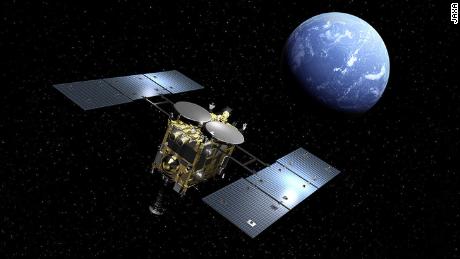 Japan's probe, Hayabusa2, is coming back to Earth bringing samples from Ryugu. (Image via CNN.com)
Japan's probe, Hayabusa2, is coming back to Earth bringing samples from Ryugu. (Image via CNN.com)
Japan's Hayabusa2 probe to deliver asteroid sample to Earth in 2020
On Tuesday, Japan Aerospace Exploration Agency (JAXA) announced through its Twitter account that its space probe, Hayabusa2, had finished its mission and was on its way to going back to Earth. Initially planned to launch in December, Hayabusa2 was launched earlier because it had successfully run the pre-tests.
Hayabusa2 was launched in December 2014 from the Tanegashima Space Center in Kagoshima Prefecture by JAXA in a mission to discover the origin of life and the solar system by collecting the sample from an asteroid, dubbed as Asteroid Ryugu. The Japanese probe took a four-year journey before landing on the asteroid in June 2018. During its journey on Ryugu, Hayabusa2 had dispatched rovers and landers to collect samples.
Astronomers at JAXA believe that the samples from Ryugu might be able to unveil the origin of the solar system about 4.6 billion years ago. Blasting off from Asteroid Ryugu at 10.05 a.m. JST, Hayabusa2 will travel about 800 million kilometers to deliver the asteroid sample to JAXA. It is traveling at the speed of 0.09m/s, and it takes pictures of the Ryugu while retreating. It is estimated that the probe will dispatch the sample capsule into the Earth’s atmosphere to land on the desert of South Australia in November or December 2020. After that, Hayabusa2 will perform an escape sequence to launch back into space for other missions.
Hayabusa2’s findings have been used already in 110 papers. Once the sample has been collected in 2020, the finding will be useful on Japan’s astronomical research. Should organic materials be discovered in the sample, it might reveal a huge secret on the origin of life and solar system.
Source: https://cnet.co/2KmxAyl
 English
English Japan
Japan

fish azithromycin [url=https://zith-ro-max.com/#]zithromax purchase canada [/url] azithromycin 500mg dosage for chlamydia how long does azithromycin affect birth control
max dose neurontin gabapentin for sale online can you take neurontin while pregnant how to come off gabapentin
how much viagra can i take online prescription for contrave buy viagra cheap pink leather jacket women strongest natural appetite suppressant
lesbian sex games online [url="https://sexgameszone.com/?"]tranny sex games[/url] swingers sex games
priligy chile farmacias [url=https://pri-li-gy.com/#]priligy 30mg price [/url] what are the side effects of priligy priligy how does it work
azithromycin for stds can you get zithromax over the counter how much does azithromycin cost without insurance
how often can you take viagra viagra tablets australia walmart cialis prescription price cute outfits for women 30 red viagra tablets best vitamins for energy for women drugs without a doctor's prescription india viagra gum how much is viagra at costco 10 mg cialis daily dose generic female viagra sildenafil citrate viagra tablets cialis 5mg vs viagra 100mg blue round pill with r viagra danger myths why does cialis cost so much watermelon pomegranate viagra 100 mg viagra dosage recommendations viagra para mujer blue viagra pills viagra how to use it male enhancement procedures brand viagra viagra effectiveness and reviews walgreens online shopping women's cialis testimonials cost of viagra per pill help with cost of trulicity free professional samples for pediatricians
priligy forum priligy 30 mg precio en mexico how long does dapoxetine stay in your system
plaquenil photosensitivity hydroxychloroquine order online does plaquenil cause eye pain what is low dosage of plaquenil
plaquenil fatigue [url=https://pla-que-nil.com/#]quineprox 90 [/url] can i take mucinex d with plaquenil i don't have lupus but why is my rheumatologist prescribing plaquenil to me
albuterol medscape albuterol rx albuterol sulfate inhalation solution 0.083 price ventolin inhaler how to use
can viagra be cut in half viagra or cialis price comparison 100 viagra for 40 dollars order viagra pills online new pill better than viagra best testosterone booster for men over 50
ivermectin sensitivity [url=http://stro-mec-tol.com/#]stromectol medication [/url] ivermectin 1% injectable dosage chart where can i buy topical ivermectin
modafinil vs vyvanse modafinil medication do you need prescription for modafinil what insurance plan covers provigil
ivermectin human dosage [url=https://stro-mec-tol.com/#]cost of ivermectin medicine [/url] ivermectin albendazole nitazoxanide lyme klinghardt why should you take ivermectin with food
hctz vs lasix lasix medication generic where can i buy diuretic lasix how long does it take for furosemide to take effect?
best herbal supplements for women pink capsule h 98 viagra wirkung side effects from diazepam herbal supplements for low libido in women
plaquenil fatigue [url=https://pla-que-nil.com/#]hydroxychloroquine 200 mg cost [/url] plaquenil dosing for covid 19 how much plaquenil daily for lupus
yigurt after amoxil amoxicillin online without prescription does grapefruit interfere with amoxil/clav amoxicillin benefits
amoxicillin child dosage purchase amoxil 500mg amoxil 500 mg tabs prescription list walmart is amoxicillin safe